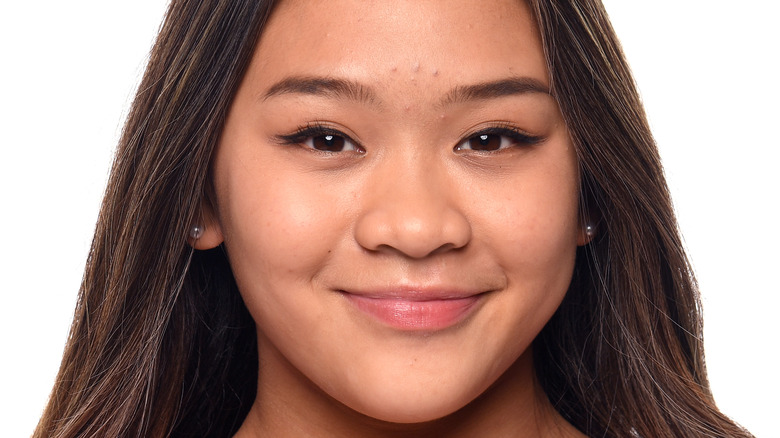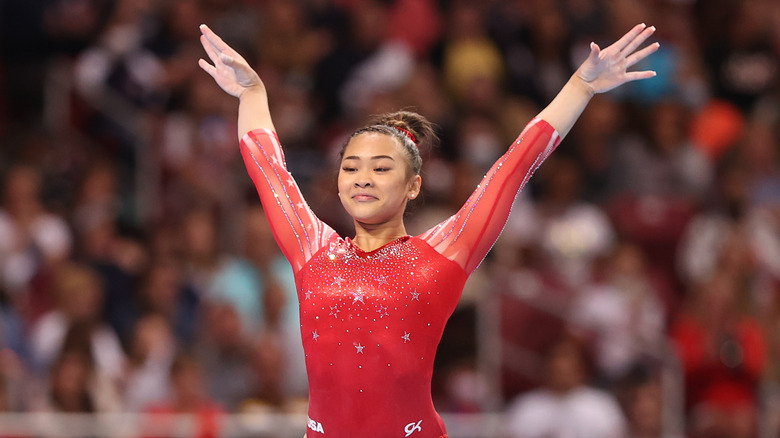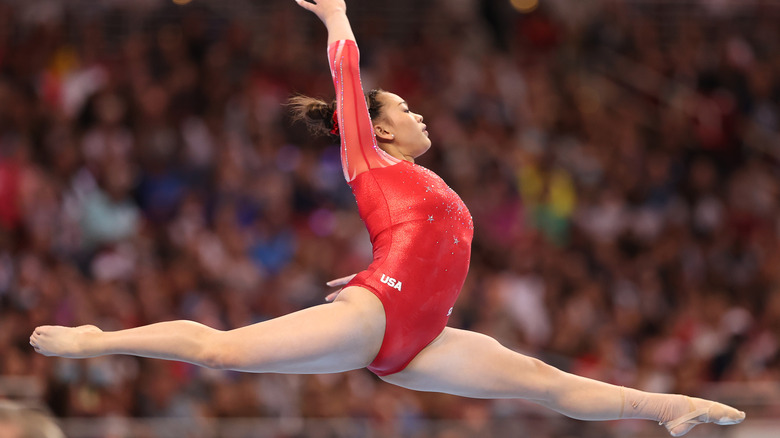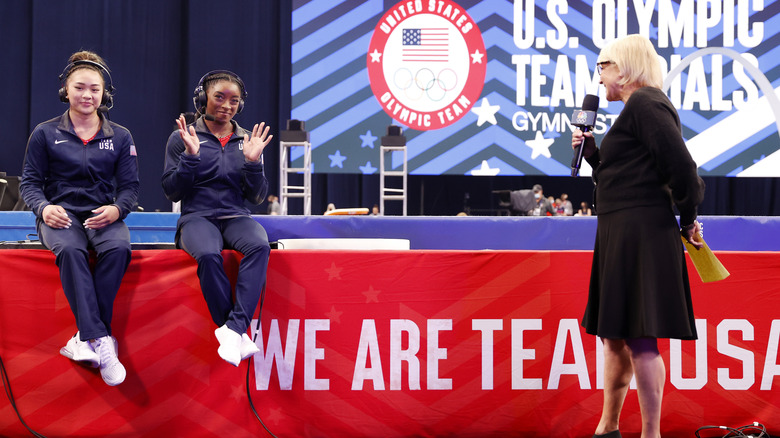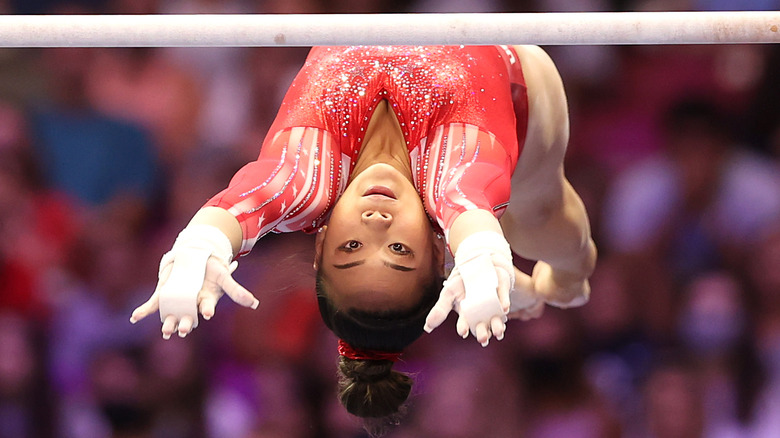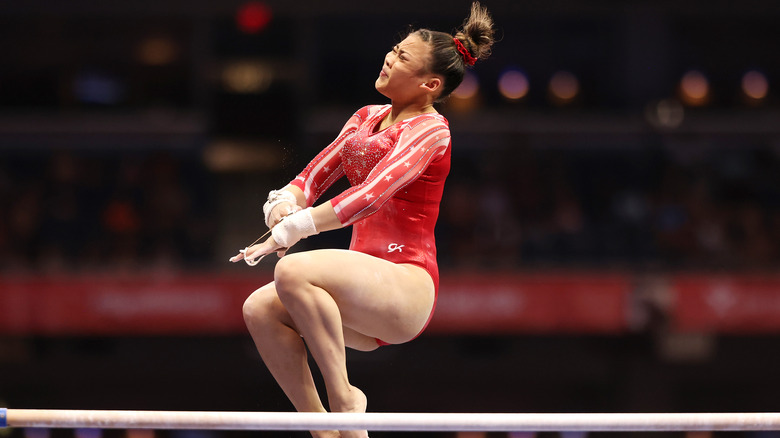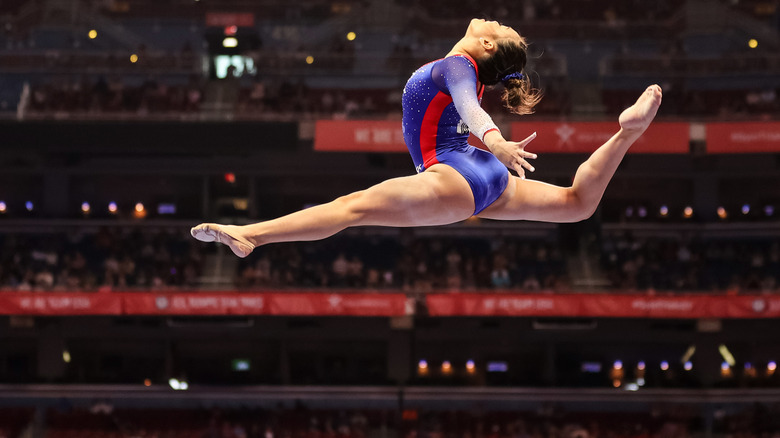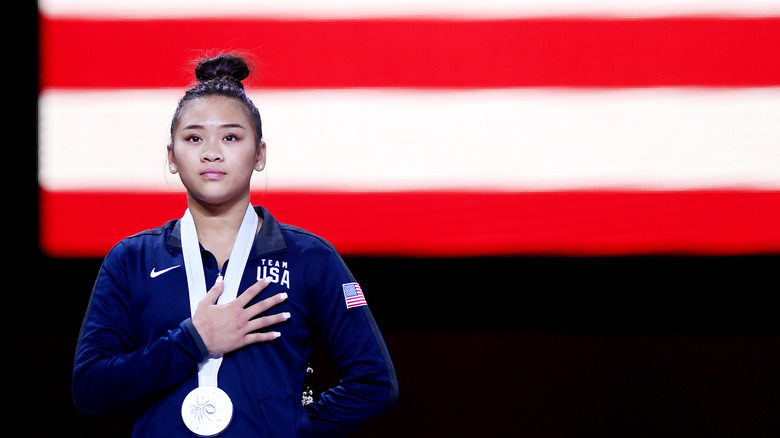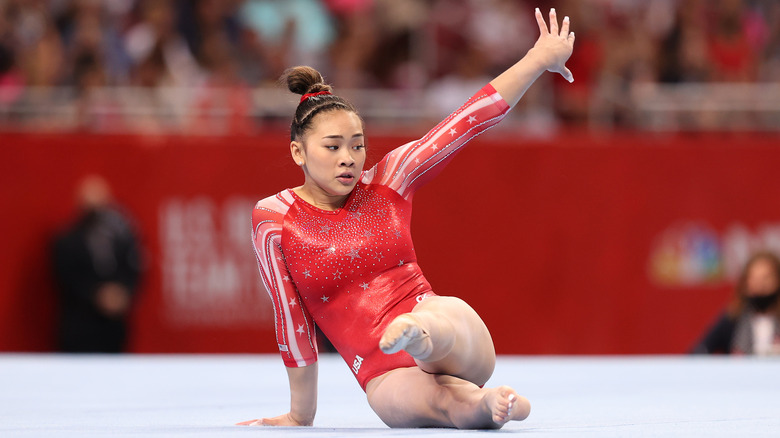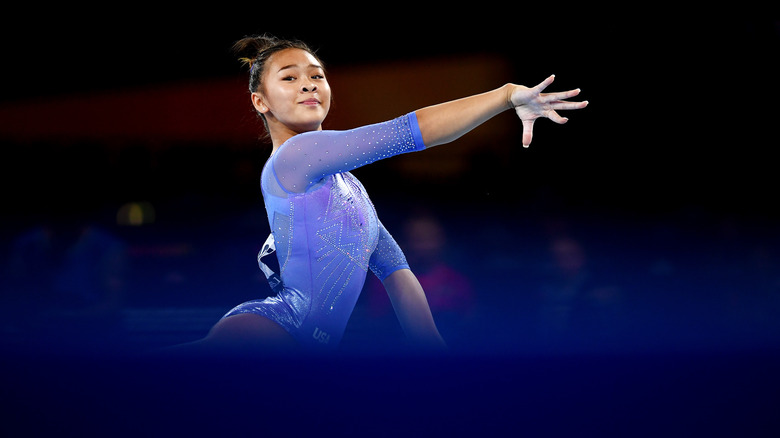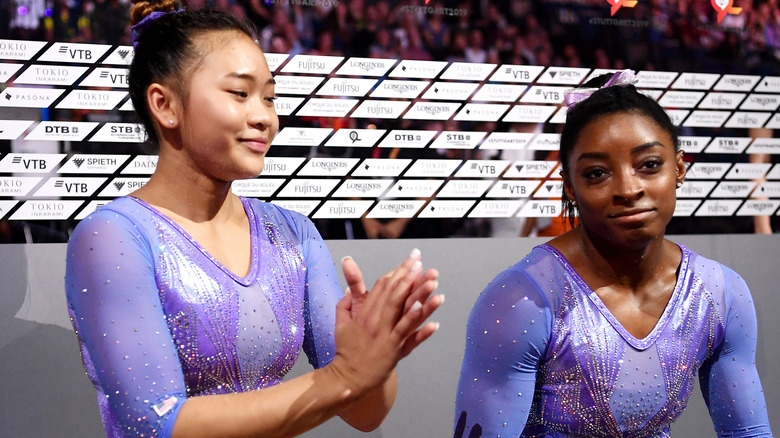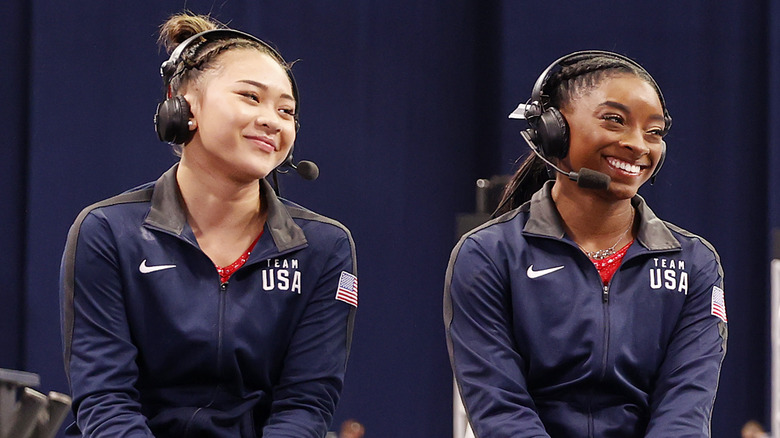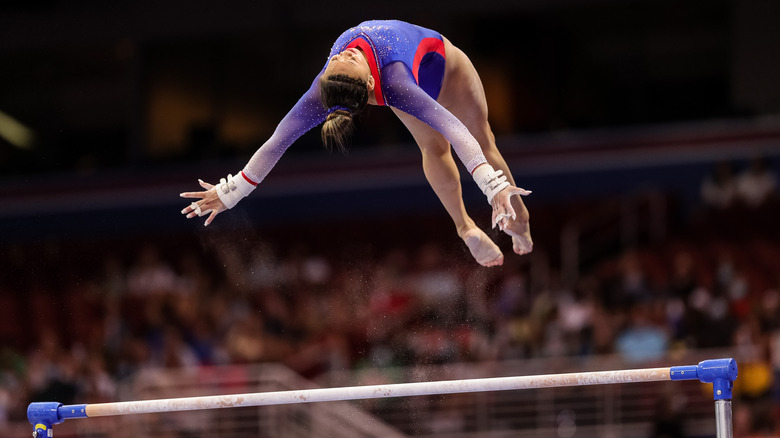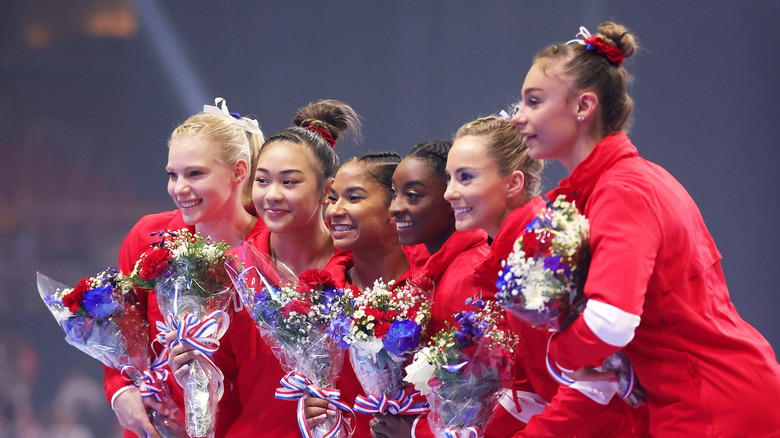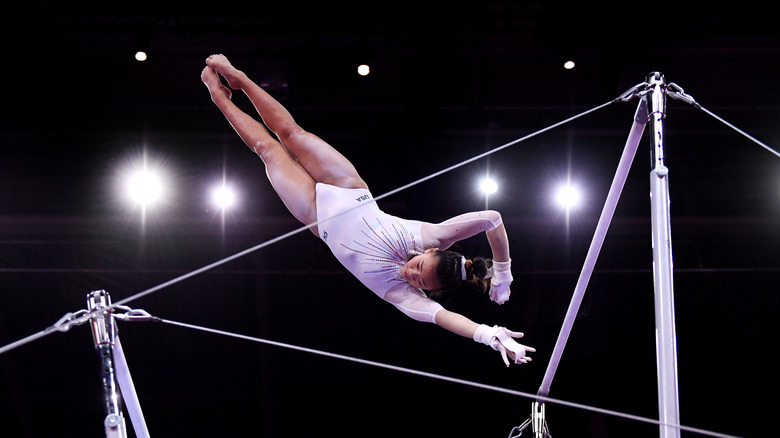The Untold Truth Of Sunisa Lee
Simply qualifying for the Olympics is a remarkable feat. But qualifying for the Olympics after being laid low by injury and a global pandemic — in the very year the governing body of your sport shrinks the number of possible slots on your team from a historic high of seven to down to four — requires Herculean effort and discipline, not to mention luck. Add personal and family tragedy to the list of obstacles between you and the Games, and you may wonder if your Olympic dream is really worth the trouble.
This was the exact predicament U.S. gymnast Sunisa "Suni" Lee found herself in. The 18-year-old from Minnesota overcame a broken ankle and a year of tragedy to take first place in the balance beam and uneven bars at the 2021 Olympic trials, as well as a close second place in the all-around rankings behind the virtually untouchable Simone Biles, according to USA Gymnastics. Biles may get all the attention — which she has no doubt earned — but Sunisa Lee is another exceptional athlete well worth watching. And at the Tokyo Olympics, Lee cemented herself in gymnastics history when she won gold, becoming the first Asian American woman to win the top spot in the all-around competition (via NBC News).
Still, despite the headlines she's made for winning, there's a lot most don't know about this young superstar.
Sunisa Lee is the first Hmong American to compete in the Olympics
When Sunisa Lee took the floor in Tokyo, she had a community besides her family, friends, and serious gymnastics fans cheering her on. A proud member of the close-knit Hmong community in Minneapolis-St. Paul, Minnesota, Lee became the first Hmong American to compete in the Olympics.
To understand why this is such a big deal, a bit of background about the Hmong is in order. According to the South China Morning Post, the Hmong are an ethnic group originating in China and Laos, but with no nation of their own. Many Hmong who fought for the U.S. during the Vietnam war emigrated to the U.S. after the war — but struggled to find a footing and economic security in their new home. Minneapolis-St.Paul, Lee's hometown, is also home to the largest Hmong community in the U.S., according to Elle, and Lee has become a local celebrity. She told Elle that attendees at Hmong events ask to take photos with her and tell her how proud they are of her, and she shared with the Bleacher Report that little girls she encounters at the gym tell her she inspired them to try gymnastics.
Lee takes her duty to represent her community seriously. "As a proud Hmong-American, I'm trying to spread positivity about Hmong people and tell people what it's like to be Hmong," she told the South China Morning Post.
Sunisa Lee discovered her love for gymnastics early
When you have a small child who just won't stop bouncing off the walls, you have two options: Give the kid a time-out or find a way to channel that energy into something productive. Suni Lee was one of those kids. By the time she was 6, she was "addicted to doing backflips," her mother revealed to the Bleacher Report. "She would start flipping outdoors at the park and things like that." To put Lee's energy to good use and give her something to do, the family began watching gymnastics videos together, and her father constructed a balance beam for her out of an old mattress, according to Elle.
But soon the family realized Lee needed a safer venue to practice her skills, so they brought her to nearby Midwest Gymnastics, where she caught the attention of coach Jess Graba, who saw her potential immediately. "It was super raw and she was just a little kid, but she had some talent," Graba told Elle. "Her flips were kind of crazy — she had been practicing in her yard — and she clearly had some ability to go upside down without fear." While Graba initially assigned her to another coach to correct the "many weird habits" she'd acquired from teaching herself gymnastics, according to the Bleacher Report, he eventually became her personal coach — and has remained so to this day.
Sunisa Lee's coaches have become as close as family
Elite athletes spend huge amounts of time with their coaches, and often experience their biggest highs and lowest lows with their mentors looking on. And because of the intensity of their work together, coaches often get to know their protégés — and their strengths, weaknesses, and vulnerabilities — probably better than most people in their circle.
Sunisa Lee's relationship with her coaches, husband and wife team Jess Graba and Alison Lim, is a case in point. According to the Bleacher Report, she trains with them between 36 and 38 hours a week, meaning she spends more of her waking hours with them than with her schoolmates or family. "My wife and I basically spend so much time with her that she's kind of like one of our kids," Graba shared. Lee concurs, calling them "both like my parents." And their parental behavior towards her includes the occasional harmless bribe: According to the Bleacher Report, "The first time Lee did a back handspring stepout to a back handspring to a full-twisting layout on a balance beam in one training session, in 2018, it was because they'd offered her a popsicle."
Paying for Sunisa Lee's training was challenging for her family
Training and competing in gymnastics, especially at elite levels, doesn't come cheap. According to Forbes, training and travel expenses for high-level gymnasts can cost up to $1,000 a month. This expense would require some planning and sacrifice for most middle-class families, but for Sunisa Lee's immigrant parents — who also have her five siblings to support, according to the South China Morning Post — it was especially challenging. Even though her coach waived her gym fees, Lee's family had to hold fundraisers and make "difficult decisions about who gets to attend her competitions and who stays home with their three younger children," according to the Bleacher Report.
Fortunately, a huge community of supporters has had Lee's back. Her talent and accomplishments have made her a source of pride in the Twin Cities' close-knit Hmong community, who not only send her letters of encouragement, but have planned fundraisers for her meets, according to Elle. Their efforts are all the more remarkable given the Hmong community has never been wealthy, according to the South China Morning Post. But after experiencing war, exile, and the challenges of rebuilding their lives in a new country, helping one of their own become a star on the international stage is well worth the sacrifice.
Sunisa Lee practices seven hours a day
Talent alone won't get you to the Olympics — no matter how good you are, you still have to practice your skills. Then practice them some more — and keep practicing, no matter what other temptations life may offer. No one understands this better than Sunisa Lee. Despite having taught herself backflips — and becoming addicted to tumbling — Lee still follows a grueling work regimen to stay at the top of her game, training seven hours a day, six days a week, according to KARE-11. Add to this a full schedule of high school classes and evening babysitting duty for her younger siblings, and it adds to a very long day.
Not many people have the drive and will to spend their childhood and teen years foregoing parties and family vacations in the interest of mastering a sport — but Lee's single-minded focus on qualifying for the Olympics gave her the motivation to stay with the program. "The dream has been me and my dad's for the longest time," she told Minnesota Public Radio. Lee and her fans are no doubt happy and relieved that her efforts have paid off.
Sunisa Lee's dad is her biggest cheerleader
Sunisa Lee has amassed a growing number of fans and admirers, but her biggest fan is also her earliest. Her father, John Lee, recognized her talent early and built her first balance beam so she could practice in their back yard, according to Elle. John also taught Sunisa a skill many parents would discourage: how to do flips by bouncing off a bed. And as her skills matured and she began competing, John was a regular and enthusiastic presence at her meets, according to KARE-11.
But John isn't just another stage dad trying to live vicariously through his child. "Me and my dad definitely have the closest bond out of everyone in my family," Sunisa told KARE-11. In an interview with the Bleacher Report, she called him her "best friend," and her lifelong coach, Jess Graba, also attests to his support, calling him "the rock of the family." And even on the rare occasion when John can't join his daughter at her competitions, his inspiration still keeps Sunisa motivated. "I wasn't in the best place, I guess, going into it," she told KARE-11 about one such meet, "but I just kind of switched gears and competed for my dad."
Sunisa Lee's father suffered a debilitating injury two days before the 2019 nationals
Sunisa Lee and her father, John Lee, are nearly inseparable; it was he who introduced her to gymnastics, according to KARE-11, and Sunisa told the Bleacher Report he's her "best friend." So when the 2019 U.S. Gymnastics Championships rolled around, John had no doubt he'd be in the stands cheering Sunisa on — as he did at most of her competitions.
However, John did not count on spending the championship in intensive care. Two days before Sunisa was to leave for the competition, he fell from a ladder while trimming a tree, resulting in injuries that paralyzed him from the chest down. This was devastating for both father and daughter, and Sunisa's coach suggested she withdraw from the championships — a distracted gymnast runs the risk of making careless mistakes that can result in serious injury. But from his hospital bed, John encouraged Sunisa to power through. "She's worked so hard for this," John explained to KARE-11. "I tell her don't worry about me, just go and do well." She did — and from his hospital bed, John, along with his wife and Sunisa's mother, Yeev Thoj, watched her take silver overall and earn a gold medal in the uneven bars. While still wheelchair-bound, John has regained some motion and was strong enough to attend the 2021 national championships — his first trip to a live competition since his accident.
COVID-19 took a heavy toll on Sunisa Lee and her family
The COVID-19 pandemic was a difficult time for most people, and even those lucky enough to escape illness often saw their lives upended. But for Sunisa Lee and her family, the pandemic hit especially hard, with lasting effects on her gymnastics career and family.
After Lee's strong showing in the 2019 national championships, she was primed for success in the 2020 Olympics. According to the Bleacher Report, 2020 was the year that should have been Lee's professional zenith — she was physically in her prime, with enough competitive experience at the elite level to be a contender. So the cancellation of the games in 2020 was a frustrating blow. "To have that taken away from us without having any control is very hard," Lee confessed in an interview with Elle. "I went through a depressed phase, and it was hard to get out of."
But other COVID-19 tragedies in Lee's family made this trivial by comparison: Her aunt and uncle, both of whom were close to her and had babysat for her as a child, succumbed to the disease within weeks of each other. The last time Lee got to see them, according to Elle, was on Zoom.
Sunisa Lee is known for her mental toughness
Forget her fearlessness or prowess on the uneven bars — Sunisa Lee's superpower is mental toughness. Despite family tragedies and frustrating obstacles, not to mention the insane expectations and grueling workload that all elite athletes endure, Lee has gained a reputation for her steely resolve and coolness under pressure — an inner strength so remarkable that even Lee's longtime idol, five-time Olympic medalist Nastia Liukin, took notice. "Her abilities as a gymnast, especially her bar routine, are incredible," Liukin said in an interview with Elle. "But it's the unparalleled mental strength that she has shown during the most difficult time of her life that make her the person she is."
For many, the devastating losses and setbacks Lee has faced over the years — her father's crippling accident, the deaths of a favorite aunt and uncle from COVID-19, her own broken ankle, and the postponement of the Olympics — would have been ample justification for pulling out of competition and focusing on recovery. "Thinking about all the bad things that have happened to me has actually made me more positive about the Olympics. It reminds me that I could handle tough times and still be okay because I've handled many tough times before," Lee told The New York Times. "I fought off the negative thoughts and the sadness, and just focused. Now I feel like I'm maybe tougher because of it. No, not maybe. I am tougher because of it."
Sunisa Lee was surprised to beat Simone Biles
Even casual fans of women's gymnastics know that elite competitors fall into two categories: Simone Biles and everyone else. So preternaturally dominant is Biles that the biggest question on most observers' minds at meets is, "Who will come in second?"
At the 2021 Olympic trials in June, it was Sunisa Lee whose solid performance earned her second place in the all-around competition, according to USA Today. This was a happy surprise for Lee, who was still recovering from an ankle injury. But even more surprising for her, she was not only "the best of the rest," she gave Biles a serious run for her money. By the end of the first day of the two-day competition, Lee had unexpectedly pulled ahead of Biles, which was the first time since 2013 anyone had outdone Biles at any stage of an all-round competition. While this wasn't Lee's first time finishing ahead of Biles — she, not Biles, took first place in the uneven bars at the trials, and she is also a two-time national champion in that event — knowing she could get so close to Biles in the all-around was a good feeling. "I think that gives me a lot of confidence," she revealed.
Sunisa Lee and Simone Biles are close friends
You may think that elite gymnasts, all competing for the same tiny handful of medals and Olympic team slots, would constantly be at each other's throats — but nothing is further from the truth. In reality, as Sunisa Lee tells the Olympics, the only people who can truly understand and empathize with the challenges of being a top gymnast are other top gymnasts, and she has come to rely on her teammates on the national team for friendship and emotional support. "Whenever I'm with them, I just get so happy and I forget about everything else," she explained. "I love them so much ... I've been talking to Morgan [Hurd], of course Laurie [Hernandez], Simone [Biles]. We all keep in touch because we're all going through a hard time now. We like to talk with each other, and we're always there for each other."
But during the COVID-19 lockdown — and the resulting postponement of the Olympics and closure of her training gym — Lee and Biles become especially close friends, according to Elle. Chatting via text and Snapchat, they commiserated over the frustration of missing out on the Olympics and life in general. "She was there for me," Lee shared.
Sunisa Lee's best event was the hardest to relearn after the COVID-19 pandemic
Sunisa Lee is known as a standout all-around gymnast, coming in a close second behind Simone Biles at the Olympic trials, according to USA Today. But it's on the uneven bars where she truly shines, coming in first at the Olympic trials and taking the national championship twice. So masterful are Lee's skills that she'd planned to introduce a challenging new move of her invention into her routine at the 2020 Stuttgart World Cup — a skill that would have been named after her had she completed it successfully, according to the Bleacher Report. Unfortunately for Lee, like the Olympics, the Stuttgart Cup was also cancelled due to the pandemic.
But despite her enviable talent on the uneven bars, Lee considers it the hardest and most nerve-wracking event. "It's mentally and physically hard compared to the other events," she told the Bleacher Report. "When you're off [your game], you know the whole thing's going to be off, like you can feel it. ... You have to be really mentally strong from the beginning." And upon restarting her training after last year's lockdown, returning to the bars was especially daunting for Lee. "The uneven bars make me especially nervous because when you stop training, you lose sense of where the bar is going to be. And I grew an inch and a half this year, so I have had to make adjustments," she explained to The New York Times.
Sunisa Lee's parents knew she'd make the Olympic team before she did
A big part of Sunisa Lee's success as a gymnast is due to the support of her parents; they were the first to notice and nurture her gymnastics talent, according to the Bleacher Report, and they regularly attend her meets and have hosted fundraisers to subsidize her training. Initially, they had no idea what they — or their daughter — were getting into; they just knew she was happy and good at what she did. "We don't know anything about Olympic potential or anything like that," Lee's mother, Yeev Thoj, confessed.
But that has changed as Lee has risen to the top ranks of her sport. In 2020, prior to the postponement of the games, Lee's parents splurged and bought plane tickets to Tokyo, planning to cheer her on before taking the family to Laos to show Lee and her siblings their ancestral homeland. There was just one potential hitch in their plan: The Olympic trials hadn't happened yet, so Lee hadn't yet officially made the team. But her parents had absolutely no doubt in their minds she'd be competing in Tokyo. And even though their prediction was off by a year, their faith in their daughter's talents was vindicated.
Sunisa Lee will be competing for Auburn University after the Olympics
Sunisa Lee won't have much time after the Olympics to rest on her laurels, since other big life changes lie ahead. As a top-ranked gymnast and high school graduate, she could have had her choice of athletic scholarships from solid schools looking to build their gymnastics programs. But from the time she was a teenager, Lee had only one school in her sights: Auburn University. "Being committed to Auburn has been one of my biggest dreams for a long time," she told The Auburn Plainsman. So serious was Lee's desire to attend that she made a verbal commitment to accept an athletic scholarship from the school when she was just 14.
Lee's longstanding affection for Auburn has its roots in her long and comfortable relationship with her coach, Jess Graba. Jess' twin brother, Jeff Graba, happens to be Auburn's gymnastics coach. "Suni had offers from pretty much every college so she could have gone anywhere," Jess revealed. "I think she felt a comfort zone with Jeff, just because he's my brother, and I think she feels like it won't be a big transition for her." But Lee's long-term goal transcends gymnastics — attending college had been a lifelong goal of hers. "I knew that if I made it to college, my life would be safe," she shared.
